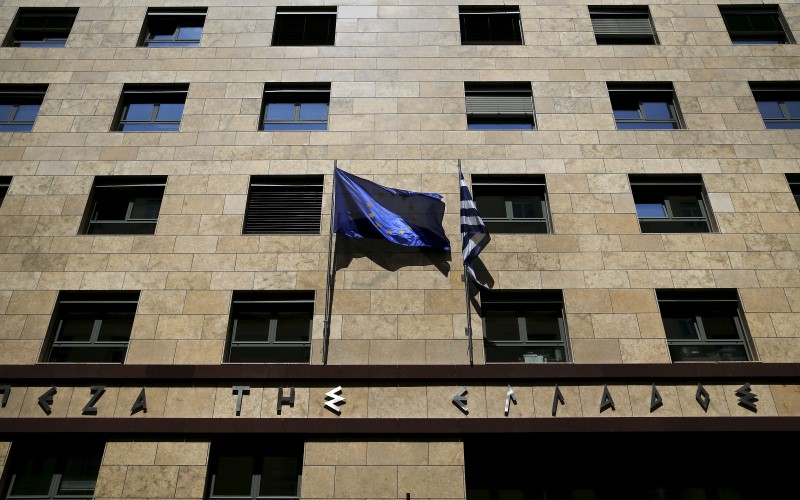By George Georgiopoulos
ATHENS (Reuters) - Greece's big banks must take faster action to clean up their huge stock of troubled loans to help the ailing economy's recovery and set the banking system on a solid footing, Eurobank's (AT:EURBr) board chairman said on Monday.
Greek lenders are saddled with tens of billions of euros of non-performing credit after a deep, protracted recession pushed unemployment to record highs, making it hard for corporate borrowers and households to service their debts.
So called non-performing exposures (NPEs), which include loans past due more than 90 days (NPLs) and restructured credit likely to turn bad, have reached some 116 billion euros ($130 billion), more than half of Greece's annual economic output.
Reducing this troubled-loan stock is the biggest swing factor for the country's banks as they continue to provision for impaired credit. The NPE stock is stabilising, with some banks managing slight reductions in recent quarters.
With pressure from regulators to reduce the bad loan burden mounting, banks are close to finalising annual targets with the European Central Bank's Single Supervisory Mechanism (SSM).
"The challenge for Greek banks today isn't capital adequacy but a strong management resolve to use effectively the substantial stock of provisions and collateral to clean up NPE portfolios," Eurobank's Chairman Nick Karamouzis told Reuters.
He said such ammunition was already in place as banks have more than 58 billion euros of provisions against NPEs and troubled loans are more than 60 percent collateralised, mainly with real estate assets.
Failure to shrink the bad loan pile risks refuelling uncertainty over banks' capital strength, delaying access to capital markets. It would tie up valuable liquidity and keep bank valuations at low levels, discouraging investors, he said.
"We need an effective NPE resolution process and we need it fast. Banks can realistically aim at reducing troubled loans by at least 10 billion euros per year over the next four years without excessively squeezing NPE asset prices via forced sales," Karamouzis said.
While Eurobank, Piraeus (AT:BOPr), National (AT:NBGr) and Alpha Bank (AT:ACBr), the country's big lenders, have made use of recent legislation and set up internal bad bank units, the problem loan buildup has not been reversed, suggesting a "need for a strategic shift", he said.
"Rather than kicking the can down the road by extending interest and principal payments, as the very low curing rates and high redefaults show, banks should use all available tools and methods for viable restructuring solutions," he said.
Banks should make more active use of external non-performing loan servicers, as Eurobank and Alpha have done with KKR and the EBRD, and pursue selective sales of long-dated bad loan assets.
In May, Eurobank and Alpha transferred 1.2 billion euros of troubled credit in large Greek companies to a platform set up with U.S. private equity firm KKR (N:KKR), as part of efforts to better manage non-performing loans.
The platform, managed by KKR's investment vehicle Pillarstone, will provide troubled but viable firms with fresh funding and expertise to help them recover. The European Bank for Reconstruction and Development (EBRD) took a 5 percent stake.
Lenders must also look into jointly setting up a bad bank with Greece's bank rescue fund HFSF and private investors, especially for large non-performing corporate exposures, Karamouzis said.
But he warned that massive forced sales of troubled loan assets at distressed prices, "would do more harm than good" amid the country's current economic woes.

"Such a policy could certainly raise questions about banks' capital adequacy, fuelling deposit outflows again, prolonging capital controls and curtailing market access," Karamouzis said.